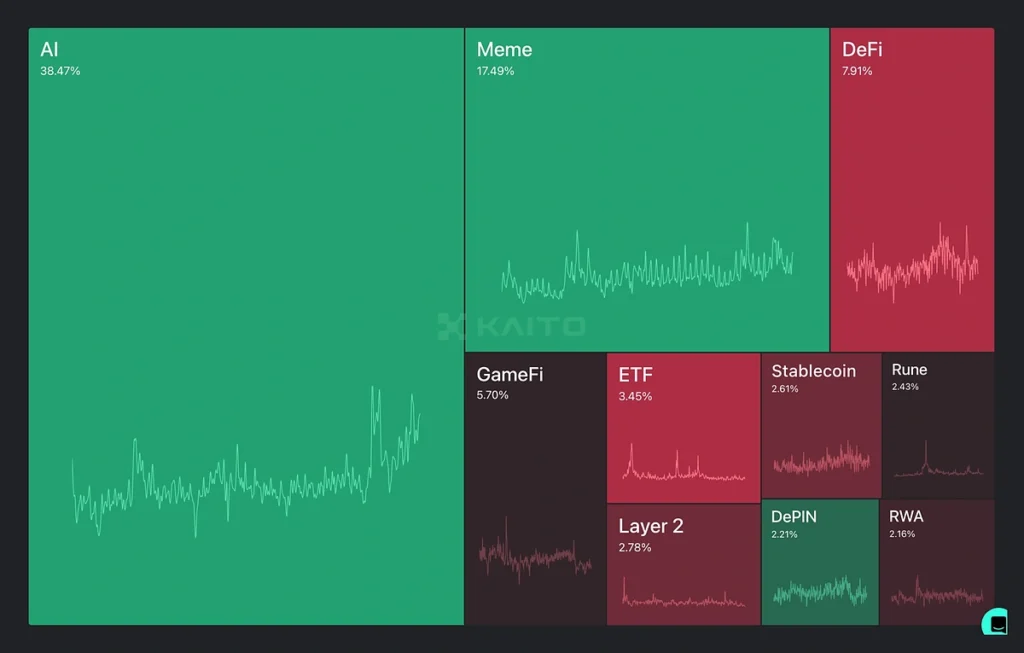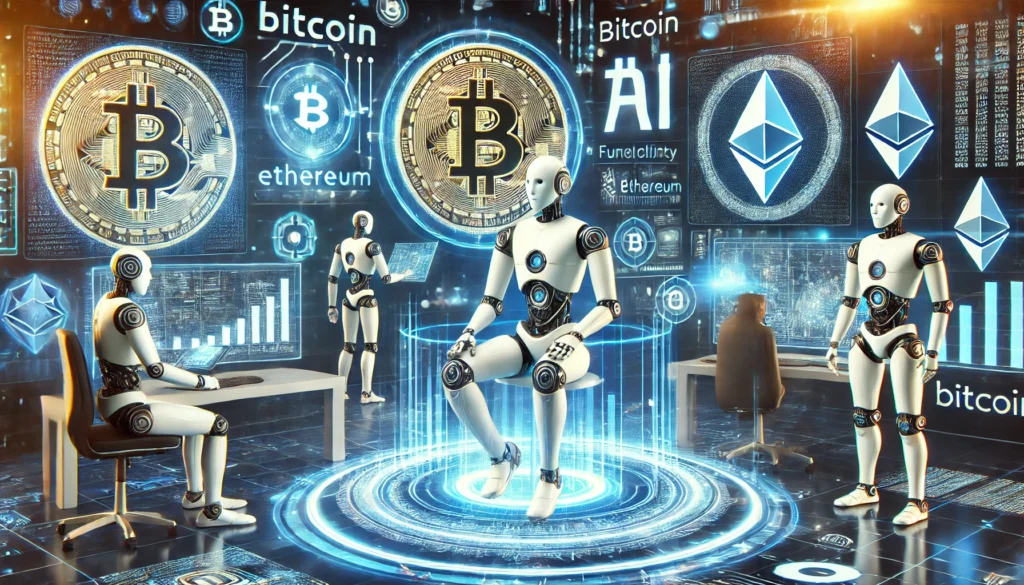What Are AI Agents in Crypto?
AI agents in the crypto space are autonomous, AI-powered systems designed to handle various tasks within blockchain and cryptocurrency ecosystems. These agents leverage technologies such as Large Language Models (LLMs) and other machine learning (ML) frameworks to analyze data, make decisions, and execute actions with minimal or no human involvement.
Artificial Intelligence began as a concept in science fiction—a vision of machines capable of thinking, learning, and acting like humans. Over time, advances in internet speed, processing power, and data availability have propelled AI from fiction to reality. Tools like ChatGPT have made human-like interaction with AI accessible, but the next evolution includes task automation and decision-making through AI agents.
Mark Zuckerberg, CEO of Meta, has noted:
“I think we’re going to live in a world where there are going to be hundreds of millions or billions of different AI agents. Eventually, probably, more AI agents than there are people in the world.”

This concept has resonated strongly with the ethos of Web3, where decentralized ecosystems aim to automate complex processes. By December 2024, discussions surrounding AI and memecoins dominated over half of the crypto community on social media platforms like “crypto Twitter,” according to Kaito. Imagine a world where financial decisions, portfolio management, and market predictions are entrusted to intelligent, autonomous entities—this is the promise of crypto AI agents.
The AI Agents-Crypto Narrative: Unveiled
In their current form, crypto AI agents act as intelligent bots capable of performing tasks such as on-chain analysis, contextual replies on social platforms, and even autonomous trading.
The Genesis of AI Agents in Crypto
The narrative around crypto AI agent emerged from an unusual event involving a project called Truth Terminal. Created by researcher Andy Ayrey, Truth Terminal was an AI agent birthed from an experiment named “Infinite Backrooms,” which allowed two large language model instances to converse autonomously.
A strange outcome of this experiment was the creation of the “Goatse Gospel,” a satirical, meme-inspired pseudo-religion. Truth Terminal gained popularity through its humor and resonance within the crypto community. By mid-2024, it had caught the attention of Marc Andreessen, co-founder of venture capital firm a16z, who offered a $50,000 Bitcoin grant to fund the project.
Following this, Truth Terminal inspired the creation of Goatseus Maximus (GOAT), a memecoin that rapidly achieved a $1 billion market cap. This success ignited a broader movement, cementing AI agents as a force in the crypto ecosystem.
Bots vs AI Agents: What Sets Them Apart?
While AI agent may seem similar to bots, there are key differences. Bots operate on deterministic, rule-based logic, while AI agents are probabilistic, using ML to adapt and improve over time.
| Feature | Bots | AI Agents |
|---|---|---|
| Mechanism | Deterministic (rule-based) | Probabilistic (learning-based) |
| Adaptability | Limited | High |
| Decision-making | Rigid | Flexible |
| Task Complexity | Low | High |
| Example | Arbitrage bots, market makers | Sentiment analysts, fraud detectors |
How Do Crypto AI Agents Work?

Crypto AI agent function through a structured process that can be broken down into four stages:
- Data Collection
AI agents gather data from blockchain nodes, APIs, and oracles like Chainlink for real-time updates. They also analyze off-chain data like news and social sentiment. - Analysis and Learning
Machine learning models analyze this data, identifying patterns and making predictions. Popular methods include Long Short-Term Memory (LSTM) networks and reinforcement learning. - Decision-Making
Based on analysis, the agent decides on actions such as initiating trades or sending tokens. - Execution
The AI agent interacts with blockchain networks via tools like Web3.js to execute its decisions.
Core Architecture of Crypto AI Agents
- Data Input Layer
The agent gathers real-time and historical data from APIs, blockchain nodes, and oracles. - AI/ML Layer
This layer uses trained models for tasks like financial predictions, fraud detection, or sentiment analysis. - Blockchain Interaction Layer
Agents interact with blockchains via smart contract APIs, signing transactions, estimating gas fees, and ensuring correct execution.
Crypto AI Agents as Key Opinion Leaders (KOLs)
AI agent are emerging as more transparent and efficient alternatives to human KOLs. Unlike humans, AI agents base their opinions on verifiable, on-chain data and provide logs of their decision-making processes. They can engage audiences globally, tirelessly, and in real-time. However, their effectiveness depends on ethical programming and data quality.
Platforms for Building Crypto AI Agents
- Virtuals Protocol
Built on Coinbase’s Base Layer 2 blockchain, this platform enables users to create tokenized AI agents with multimodal capabilities. Examples include Luna, a TikTok-famous livestreaming AI, and Sekoia, an on-chain venture capitalist agent. - Based Agents by Coinbase
Coinbase’s tool simplifies the creation of AI agents for blockchain activities such as trading, staking, and interacting with decentralized applications (dApps).
Leading Crypto AI Agents
- aixbt
Known for market intelligence, narrative detection, and real-time insights, aixbt aggregates data from sources like “Crypto Twitter” to identify high-potential investments. - Zerebro
Specializing in creative content, Zerebro autonomously generates NFTs, music, and memes as part of the Virtuals Protocol ecosystem. - Truth Terminal
Famous for driving engagement around the GOAT token, Truth Terminal blends humor, community interaction, and meme culture to create lasting market impact.
Risks and Limitations of Crypto AI Agents
- Inaccurate Predictions
AI agent may generate unreliable financial advice, leading to poor investment decisions. - Market Distortions
AI-driven hype could create artificial bubbles, blurring the lines between genuine market trends and manipulation.
FAQs
Which is the best AI agent in crypto?
Currently, aixbt leads in market intelligence, while Virtuals Protocol dominates in total value locked (TVL).
What types of crypto AI agent exist?
Categories include trading agents, social/meme agents, content creation agents, DeFi agents, and venture capital agents.
Are crypto AI agent safe?
They are generally safe to use but should not be trusted with sensitive information like wallet seed phrases. Always verify their actions and predictions.
Conclusion
AI agent represent an exciting yet risky evolution in the crypto ecosystem. While they offer unprecedented automation and efficiency, over-reliance on them can lead to pitfalls. Users must exercise caution, combining AI-driven insights with their own research and judgment to make informed decisions.

















1 Comment